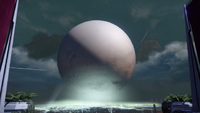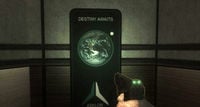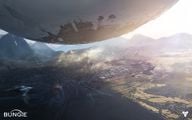The Traveler: Difference between revisions
From Destinypedia, the Destiny wiki
m (→Trivia) |
m (→Trivia: Minor clean-up & clarification.) |
||
| Line 40: | Line 40: | ||
*The size of The Traveler has changed on numerous occasions in artwork, sometimes being the size of a moon, to being the size as The City. | *The size of The Traveler has changed on numerous occasions in artwork, sometimes being the size of a moon, to being the size as The City. | ||
*According to [[Xûr, Agent of the Nine|Xûr]], there is a dark mirror of the Traveler. | *According to [[Xûr, Agent of the Nine|Xûr]], there is a dark mirror of the Traveler. | ||
*The terms ''"Retrograde"'', ''"Zenith"'', ''"Epicycle"'' ''"Theta State"'' and ''"Valence"'' are used in tracking the Traveler's Light output | *The terms ''"Retrograde"'', ''"Zenith"'', ''"Epicycle"'' ''"Theta State"'' and ''"Valence"'' are used in tracking the Traveler's Light output. | ||
**''"Retrograde"'', ''"Zenith"'', ''"Epicycle"'' are astronomical terms. In astronomy, the ''zenith'' is the point at which something appears directly overhead relative to an object or observer. ''Epicycle'' is | **''"Retrograde"'', ''"Zenith"'', ''"Epicycle"'' are astronomical terms. In astronomy, the ''zenith'' is the point at which something appears directly overhead relative to an object or observer. ''Epicycle'' is a former astronomical term which was once used to describe the motions of other planets, relative to Earth, but has since been disproven; however, it still finds use in astrology. It was based on the old "geocentric" belief that the heavens and all objects within it travelled around the Earth. Observers would often note that the planets seemed to slow and change their trajectories in the course of their passage across the night sky, appearing to trace loops in their orbits relative to the stars behind them. This led to the concept of an ''epicycle'': or a smaller rotation of a planet around a barycenter in the course of its larger rotation around the Earth itself. The period in which a planet appeared to slow and descend into a loop, just prior to appearing to move backwards, was known as the declining or descending phase. The period during which the planet traced the bottom half of the loop, appearing to move in the opposite direction from its orbital path is known as the ''retrograde'' phase. "Equilibrium" denotes the point at which the planet ceases to move backwards and begins to ascend out of the loop and into its normal orbital path once again, denoting the end of that particular epicycle. This particular astronomical theory was eventually proven to be an optical illusion after Copernicus introduced the then-radical notion that the Earth was '''''not''''' the center of existence & that all planetary bodies within the solar system, including Earth, revolved around the Sun. Johannes Kepler later proved that the so-called "epicycles" were the result of the Earth's orbital position relative to that of the planet being observed. | ||
**The term ''"Theta State"'' refers to a [[Wikipedia:Theta_rhythm|Theta Rhythm]], which is an oscillatory pattern of brainwave activity in electroencephalography (EEG). This rhythm occurs within the human brain's hippocampal and neocortical regions at between 4 Hz. and 7 Hz. In both regions, these signals have been associated with transitioning from a dream-state to wakefulness. | **The term ''"Theta State"'' refers to a [[Wikipedia:Theta_rhythm|Theta Rhythm]], which is an oscillatory pattern of brainwave activity in electroencephalography (EEG). This rhythm occurs within the human brain's hippocampal and neocortical regions at between 4 Hz. and 7 Hz. In both regions, these signals have been associated with transitioning from a dream-state to wakefulness. | ||
**In chemistry, the ''"Valence"'' of an element is a measure of its ability to bond with other atoms when it forms chemical compounds or molecules. | **In chemistry, the ''"Valence"'' of an element is a measure of its ability to bond with other atoms when it forms chemical compounds or molecules. | ||
:These terms are drawn from 3 different fields of science and the exact manner in which they apply to the Traveler's Light output is unclear at this time, save that they are used to indicate a repeating pattern. | |||
==Gallery== | ==Gallery== | ||
Revision as of 08:54, March 17, 2015
| “ | They call it the Traveler. We watch as it hangs above. The mysterious sphere, silently protecting us. | ” |
The Traveler is a mysterious sphere floating above Earth. Massive in scale, it is unknown whether the huge celestial object is simply a derelict spacecraft or a sentient being in itself. Hanging motionless in the skies above the last human city built in its shadow, it protects the humans from the continuous onslaught of various alien races bent on humanity's eradication by projecting a shield around the City,[1] and gifts the Guardians with ancient and mysterious powers.
History
The origins or nature of the Traveler is not clear to anyone. However, some information can be gleaned from the poem known as Dreams of Alpha Lupi. The Traveler's outer surface is made ofNeutronium and "Electroweak matter", both hypothetical materials;[2] the former is believed to make up Neutron Stars, and the latter is based on a fundamental force that hasn't existed since the dawn of time. Furthermore, it appears that the Traveler chose Earth and Humanity for a reason; it detected a "face" emerging from the Sun, later hearing a roar that contained something that it described as "a lucid melody". The Traveler felt joy, as it felt "the first hope in ages transform [it]," and it resolved to become strong enough to fight the Darkness.[2]
The Traveler has helped other worlds before, but has never wished to be worshiped as a God, nor making its presence known any more than necessary to cultivate a civilization. It would seem then that it's defense of humanity was an extraordinary act.[2]
When the Traveler first arrived to the solar system, it first visited Jupiter, Mercury and Venus, drawing humanity's attention. By the time Ares One landed on Mars,[3] the Traveler had brought the first rain to the desert planet.[4][5] It helped humanity expand across the solar system, teaching humans new technologies, helping them terraform planets and leading humanity into a Golden Age. It then gave it's "instructions" to "the trusted few" before disappearing, apparently having completed its mission.[6]
Some time later, the Traveler's main enemy, the Darkness, battled with the Traveler, leading to the destruction of almost all human civilization in an event known as the Collapse.[7] Forcing the Traveler out of hiding, it raced to rescue it's "children", humanity.[2] At the end of the wars that terminated the Golden Age, the Traveler, in its sacrificial last gift to humanity, came to rest over a small area of the now wasted human planet. The Traveler lays dormant now, apparently stripped of its senses and "flesh" by the Darkness, made blind, deaf and mute to the outside world. [8] As humanity struggled to rebuild itself from these events, the crippled object gifted its protection and powers to the recovering humans. Although the times after the war were difficult, humanity persevered and with the help of this celestial guardian, the humans eventually began to re-explore their terrestrial and solar domain.[9] In its last breath, the Traveler created the Ghosts, to seek out those who can wield its light as a weapon. The Ghosts revived fallen warriors as Guardians, protecting humanity when the Traveler no longer could.[10]
The remnants of humanity built the City beneath the resting place of the Traveler, where they were safe from the continuous onslaught of various alien races such as the Cabal and the Fallen . This city rests in the shade of the great sphere, built under its protective aura as a last bastion of humanity. The Guardians are destined to protect this city and its inhabitants, and as such are gifted with some of the magnificent powers of the Traveler.[11] Some believe that the Traveler chose Earth for a reason, and it is humanity's obligation to prove itself worthy of its light.[12]
With the Darkness returning, humanity fears they will not be able to survive it this time. As a last ditch effort, the player is given the ultimate task of attempting to wake the Traveler before the Darkness arrives, in order to drive it back.[7] The Guardians are able to help the Traveler slowly restore its light, first by stopping a Hive ritual in the Chamber of Night that is siphoning light from the Traveler, and then destroying the heart of the Black Garden.[13]
Status variations
The Traveler's emission of Light appears to undergo cyclical fluctuations. These fluctuations are tracked by the Tower and reported over loudspeaker in the Tower North.[13] Traveler status announcements include:
- "Traveler at 1 revolution per zenith."
- "Traveler approaching zenith."
- "Traveler entering zenith."
- "Traveler intensity at zenith."
- "Traveler exiting zenith."
- "Traveler declining 1 revolution per zenith."
- "Traveler entering declining phase."
- "Traveler entering retrograde phase."
- "Traveler entering equilibrium."
- "Traveler approaching theta state."
- "Traveler entering theta state."
- "Traveler in theta state."
- "Traveler exiting epicycle. Returning to main cycle."
- "Traveler at minimum valence. The Light persists."
Trivia
- The Traveler first appeared in another Bungie game, Halo 3: ODST, where a hidden poster made it appear innocuously like the Moon.
- The size of The Traveler has changed on numerous occasions in artwork, sometimes being the size of a moon, to being the size as The City.
- According to Xûr, there is a dark mirror of the Traveler.
- The terms "Retrograde", "Zenith", "Epicycle" "Theta State" and "Valence" are used in tracking the Traveler's Light output.
- "Retrograde", "Zenith", "Epicycle" are astronomical terms. In astronomy, the zenith is the point at which something appears directly overhead relative to an object or observer. Epicycle is a former astronomical term which was once used to describe the motions of other planets, relative to Earth, but has since been disproven; however, it still finds use in astrology. It was based on the old "geocentric" belief that the heavens and all objects within it travelled around the Earth. Observers would often note that the planets seemed to slow and change their trajectories in the course of their passage across the night sky, appearing to trace loops in their orbits relative to the stars behind them. This led to the concept of an epicycle: or a smaller rotation of a planet around a barycenter in the course of its larger rotation around the Earth itself. The period in which a planet appeared to slow and descend into a loop, just prior to appearing to move backwards, was known as the declining or descending phase. The period during which the planet traced the bottom half of the loop, appearing to move in the opposite direction from its orbital path is known as the retrograde phase. "Equilibrium" denotes the point at which the planet ceases to move backwards and begins to ascend out of the loop and into its normal orbital path once again, denoting the end of that particular epicycle. This particular astronomical theory was eventually proven to be an optical illusion after Copernicus introduced the then-radical notion that the Earth was not the center of existence & that all planetary bodies within the solar system, including Earth, revolved around the Sun. Johannes Kepler later proved that the so-called "epicycles" were the result of the Earth's orbital position relative to that of the planet being observed.
- The term "Theta State" refers to a Theta Rhythm, which is an oscillatory pattern of brainwave activity in electroencephalography (EEG). This rhythm occurs within the human brain's hippocampal and neocortical regions at between 4 Hz. and 7 Hz. In both regions, these signals have been associated with transitioning from a dream-state to wakefulness.
- In chemistry, the "Valence" of an element is a measure of its ability to bond with other atoms when it forms chemical compounds or molecules.
- These terms are drawn from 3 different fields of science and the exact manner in which they apply to the Traveler's Light output is unclear at this time, save that they are used to indicate a repeating pattern.
Gallery
List of appearances
- Law of the Jungle (First appearance)
- Destiny
References
- ^ Bungie: Destiny story: The City
- ^ a b c d Bungie (2014-9-9), Destiny, PlayStation 4, Activision Blizzard, Grimoire: Ghost Fragment: The Traveler Cite error: Invalid
<ref>tag; name "TravelerGhost" defined multiple times with different content - ^ Bungie (2014-9-9), Destiny, PlayStation 4, Activision Blizzard, Grimoire: Ghost Fragment: Humans
- ^ Bungie Destiny Story
- ^ YouTube - Destiny: Official E3 Gameplay Experience Trailer
- ^ Bungie (2014-9-9), Destiny, PlayStation 4, Activision Blizzard, Grimoire: Ghost Fragment: Moon
- ^ a b Gameinformer: Jason Jones – The Destiny Interview
- ^ Bungie (2014-9-9), Destiny, PlayStation 4, Activision Blizzard, Grimoire: Ghost Fragment: The Traveler 3
- ^ Game Informer January 2014, page 52
- ^ Bungie (2014-6-12), Destiny: Alpha PlayStation 4, Activision Blizzard, Grimoire: Ghosts
- ^ YouTube: Reveal Trailer - Official Destiny ViDoc: Pathways Out of Darkness
- ^ Bungie (2014-6-12), Destiny: Alpha PlayStation 4, Activision Blizzard, Grimoire: Human
- ^ a b Bungie (2015-3-10), Destiny: Activision Blizzard






